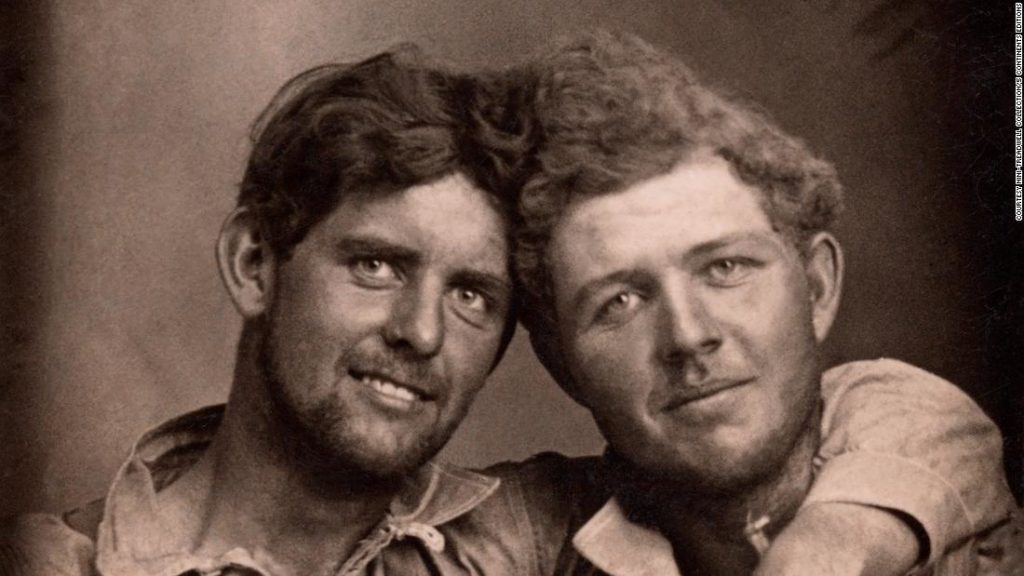When Hugh Nini and Neal Treadwell came across an old photograph at an antique store in Dallas, Texas, they saw something of themselves reflected in the image.
Taken around 1920, it showed two men in front of a house, posing in a loving embrace at a time when being gay was not only frowned upon but effectively illegal.
“It represented us, so we bought the photo, took it home and had it on our desks for six or nine months,” Treadwell recalled in a phone interview from the couple’s home in New York City. “It was a random find, and we never thought we’d find another one.”
Yet, in the two decades since, the pair discovered far more — in fact, by scouring auctions, junk stores and flea markets, they’ve amassed an archive of almost 3,000 images of men in love.
1/10
A thin paper photograph, known as a cabinet card, dating back to around 1880. Scroll through to see more images from “Loving: A Photographic History of Men in Love, 1850s-1950s.” Credit: Courtesy Nini-Treadwell Collection/5 Continents Editions
Captured between the mid-19th century and just after World War II, and taken across five continents, the collection comprises portraits and candid shots of couples lying in bed, picnicking on grass and posing beside their cars. Nini and Treadwell may not know the circumstances in which the pictures were taken, but they believe the subjects’ body language and mutual gazes are, unmistakably, those of romantic lovers.
“This book means, for the first time, that these people, these couples, get to speak for themselves,” Nini said. “They couldn’t do it when they were alive, but they can do it now, and I think that’s really powerful.”

An image believed to be from the turn of the 20th century. Same-sex marriage was legalized in the United States more than 100 years later. Credit: Courtesy Nini-Treadwell Collection/5 Continents Editions
Given that many of the images come from a time when taking, developing or keeping such photos could pose a significant risk to one’s personal safety — or even freedom — the pictures also represent individual acts of bravery, he added.
“These couples did something very risky because they really cared about each other. They memorialized their feelings with these photographs, and then had to hide them forever,” he said.
Forbidden love
Nonetheless, their collection shows historical examples of men exchanging rings and partaking in informal wedding ceremonies. In one image, believed to be from the turn of the 20th century, a young pair are seen holding a sign reading, “Not married but willing to be.”
As well as showing the evolution of attitudes, hairstyles and fashion through the decades, the images also chart the development of photography as a medium. The collection’s oldest pictures were made using early forms of camera, and include ambrotypes, which were produced on glass, and daguerreotypes, which appeared on metal plates.

As well as posed portraits, the collection contains pictures of couples lying in bed and having picnics. Credit: Courtesy Nini-Treadwell Collection/5 Continents Editions
The archive travels through to the emergence of paper photography and then photo booths, which, like the various shots taken in the reflections of mirrors, eliminated the need to confide in a photographer.
And while Nini and Treadwell know next to nothing about their subjects, they know even less about where the physical photos have been in the decades since.
“Some of the pictures have creases in them, so perhaps they were folded and put in a wallet, while some are pristine, where they had been tucked in a book or hidden away in a drawer,” Treadwell said.
“It’s astonishing to us to wonder what that journey was — not only for the couple but for the photograph being passed along. Was it shared by friends? Was it celebrated by a family? How did it make its way into our hands?”

An undated image believed to have been taken in the US. Credit: Courtesy Nini-Treadwell Collection/5 Continents Editions
It is, therefore, left to the viewer to imagine the stories behind each photo. And the breadth of positive responses to the collection is testament to the universality of love, the pair said.
“It’s very heart-warming and gratifying to know that it’s meaningful, and that this spans from someone who’s 18 or 20 right up to grandparents who are looking at (the pictures) because their grandchildren are gay. Or it’s an elderly gay person, or straight people — the whole gamut,” Treadwell said.
“The message of our book is not about sexuality at all,” Nini added. “Our position is that love doesn’t have a sexuality — it’s universal.”
You may also like
-
Afghanistan: Civilian casualties hit record high amid US withdrawal, UN says
-
How Taiwan is trying to defend against a cyber ‘World War III’
-
Pandemic travel news this week: Quarantine escapes and airplane disguises
-
Why would anyone trust Brexit Britain again?
-
Black fungus: A second crisis is killing survivors of India’s worst Covid wave

